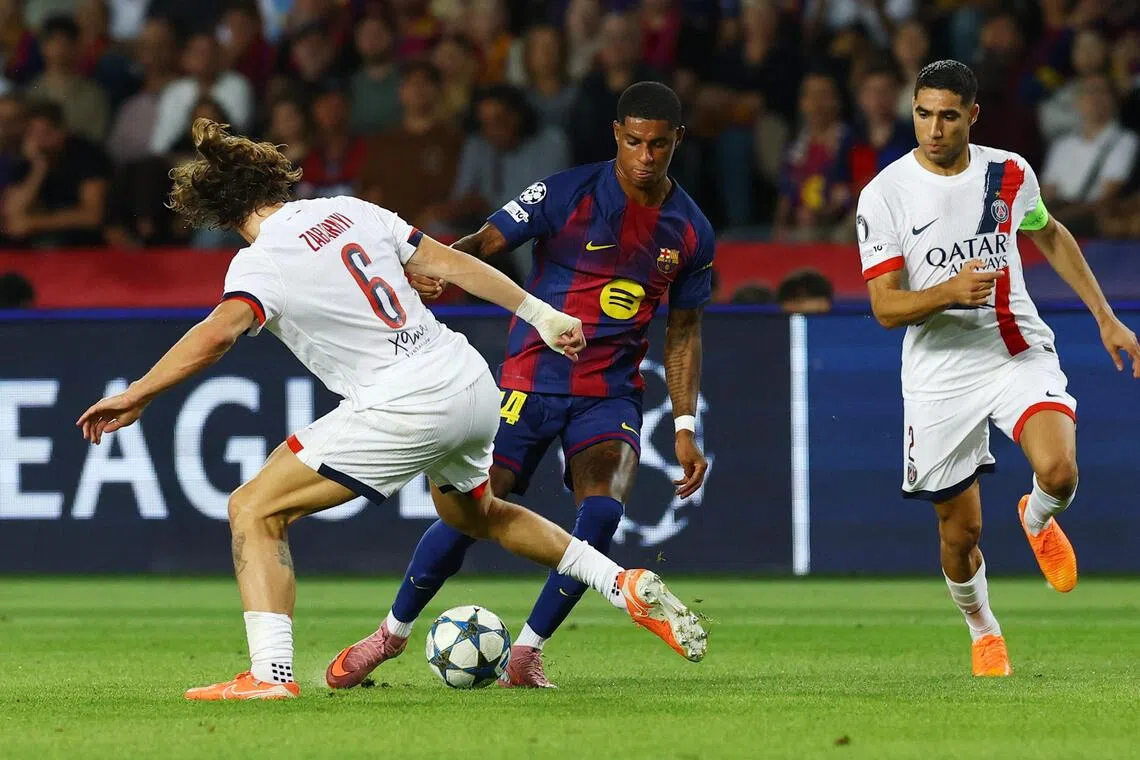In The Spotlight
Marcus Rashford’s revival lights up Barcelona’s attack ahead of Sevilla clash
In this new series, The Straits Times highlights the standout players or teams to watch in the world of sport. Today, we focus on Marcus Rashford’s revival in form following his loan move from Manchester United to Barcelona.
Sign up now: Get the biggest sports news in your inbox

Marcus Rashford has transformed from a sidelined figure at Old Trafford to a key contributor in Catalonia since arriving at Barcelona.
PHOTO: REUTERS
Follow topic:
When Barcelona face Sevilla in La Liga on Oct 5, all eyes will inevitably be on Marcus Rashford, the Manchester United loanee whose resurgence has injected fresh dynamism into Hansi Flick’s squad.
Since arriving at the Spanish giants on a season-long loan in July, the 27-year-old has transformed from a sidelined figure at Old Trafford to a key contributor in Catalonia, boosting his hopes for a spot in Thomas Tuchel’s England squad for the 2026 World Cup.
His recent form – two goals and five assists in nine games in all competitions – positions him as a pivotal player to watch against a Sevilla side looking to disrupt Barcelona’s title defence.
Rashford’s move came after a turbulent spell at United, where he was exiled by manager Ruben Amorim and spent the second half of the 2024-25 season on loan at Aston Villa
United’s dismal 15th-place finish in the Premier League underscored the club’s struggles, and Rashford’s fallout with the Portuguese over perceived attitude issues sealed his departure.
In contrast, Barcelona, fresh off a domestic treble under Flick, offered a dream landing spot.
Rashford himself described Barca as “a place where dreams come true”
But beyond the romance, what has truly reignited his spark?
The differences between the environments at Barcelona and United – tactical structure, coaching philosophy, reduced pressure, and a shift in personal mindset – have been instrumental.
One of the most striking contrasts lies in the tactical set-up.
At United, Rashford often operated in a chaotic system plagued by inconsistency and defensive disorganisation, particularly under Amorim’s regime, where he was criticised for lacking defensive effort and struggling with pressing responsibilities, which exposed gaps in the team’s shape.
This forced him into uncomfortable roles, covering vast distances without the ball and limiting his time in preferred attacking zones.
Barcelona’s system under Flick, however, is built on compactness and high pressing, allowing Rashford to focus on transitions and half-spaces on the left flank – his natural habitat.
Flick deploys him primarily as a left winger, integrating him into a fluid attack that led Europe’s top five leagues in goals last season, with 102 in La Liga alone.
This structure minimises defensive burdens, as Barcelona’s midfield control – bolstered by players like Pedri and Frenkie de Jong – frees Rashford to exploit spaces.
Central to this revival is Flick’s coaching and mentorship, a key factor in Rashford’s adaptation to football in a different country.
But while Rashford has the freedom to attack, Flick also warned the player about the need for improved defensive commitment, telling beIN Sport: “If Rashford wants to play, he’ll have to earn his spot and work harder off the ball.”
The German’s high-intensity training regime initially left Rashford “exhausted”, but it has built his fitness and instilled discipline – the latter he seemingly lacked at United.
After the 2-1 Champions League win over Newcastle United
“We always see this from Rashford in training... These two goals will help a lot to get Marcus to the next step,” he said.
Even after a recent lapse – being dropped for arriving just two minutes late to a team meeting ahead of the visit of Getafe – Flick’s policy of accountability, applied equally to stars like Raphinha, reinforced professionalism without lasting damage.
Rashford responded by registering an assist off the bench, signalling a buy-in to Flick’s demanding yet supportive approach – a far cry from Amorim giving him the cold shoulder.
Yet, the core of Rashford’s turnaround appears rooted in a profound attitude shift, amplified by Barcelona’s less pressurised environment, compared to United’s media glare and fan expectations.
At Old Trafford, he faced relentless scrutiny over his form dips and off-field activism, which some viewed as distractions, while the Catalan media’s focus – more on team culture than individual drama – has allowed him to refocus.
Deco, Barcelona’s sporting director, credits the change to alleviated pressure, saying to Mundo Deportivo: “He had years of more complicated management with changes of coaches, and perhaps he struggled too because they demanded a lot of things from him there.
“But we’re happy with him; that’s the most important thing.”
Rashford himself reflected, telling TNT Sport: “I’m learning a lot, it’s a new style of football... But it’s making me a better player. Honestly, it’s an amazing experience.
“He’s (Flick) very important. I feel the confidence he’s given me. I knew he was a top manager before I arrived here, but to work with him is a pleasure. I hope the good relationship will continue for the rest of the season.”
Statistically, the proof is in the numbers. His goal involvements – goals and assists – for the team say it all.
This surge contrasts sharply with his United output, where attitude critiques overshadowed talent.
Playing alongside elite talents like Lamine Yamal and Robert Lewandowski has elevated him, as he noted his desire to “play with the best”.
Against Sevilla, Rashford’s pace and finishing could exploit their defensive vulnerabilities, especially in transitions. Flick’s confidence in him – starting him in big ties – suggests he will feature prominently.
As former United teammate Rio Ferdinand hailed his revival, posting on X that he looks “reborn”, Rashford is proving that a change of scenery, coupled with discipline and the right guidance, can unlock untapped potential.
For Sevilla, containing this revitalised forward will be the match’s defining challenge.

